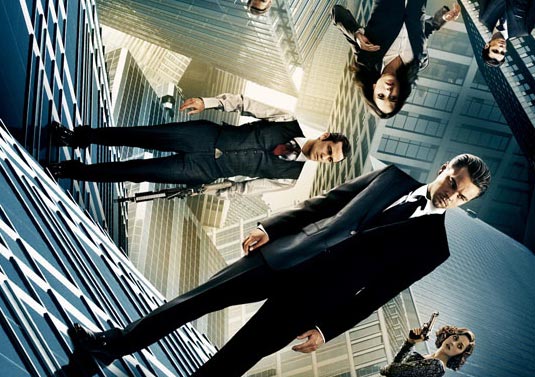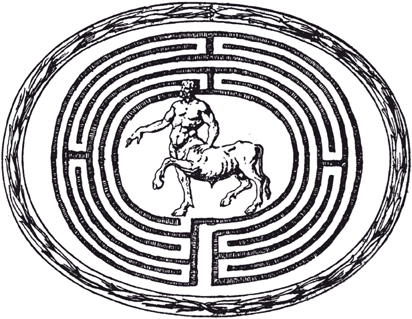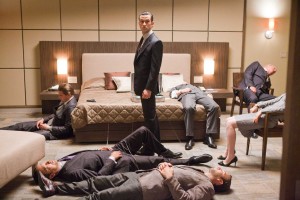Inception – A Labyrinth of Dreams
Warning: Contains spoilers for the movie Inception! Will probably also not make much sense without having seen the movie.
Sometimes I dream that I’m slipping or falling over, and the sensation I feel in the dream sends impulses to my body causing my legs and arms to try catch the fall (and thus move) – which instantly wakes me up. But it has happened that I dreamed about falling down and down from somewhere very high for a long time, without being able to wake up from the dream. I kept falling and I felt that tingling, yet incredibly scary, sensation in my stomach as well as the insecurity of not knowing if I will land safely.
 Those are two of the things I had to think about when I watched Christopher Nolan’s Inception last night. Nolan has created something that is very rare these days: an on-screen odyssey which at the same time is also a mystery, a labyrinth and a philosophical rumination. He has drawn inspiration heavily from literature, culture and innumerable films (personally it reminded me of eXistenZ a lot). He even made it a bit easier for the more ‘mainstream’ members of the audience to interpret his “dream” by shoving obvious hints into their faces.
Those are two of the things I had to think about when I watched Christopher Nolan’s Inception last night. Nolan has created something that is very rare these days: an on-screen odyssey which at the same time is also a mystery, a labyrinth and a philosophical rumination. He has drawn inspiration heavily from literature, culture and innumerable films (personally it reminded me of eXistenZ a lot). He even made it a bit easier for the more ‘mainstream’ members of the audience to interpret his “dream” by shoving obvious hints into their faces.
But before I get to that, I should mention something important: Inception is not a movie about dreams. The “dreams” in Inception are consciously created constructs, whereas real dreams are random, unfathomable and strange. In real dreams, places can turns into other places, people can turn into other people and actions / plots / happenings rarely ever make sense. I have dreamed about inline skating to the gates of hell (which had elaborate maps of it and were located down the road of my home village), about a dancing competition between Fred Astaire and Neil Gaiman, about hunting a drug dealer called Orlando Bloom, about being hunted by zombie sheep (and chanting them away into a stupor), about Superman attacking people with radioactive laser beams and about being lost in a very dark Sleepy-Hollow-Stylish dungeon (this might sound scary, but my dreams usually amuse me rather than scare me). If you’re thinking “WTF?”, I’m with you – but those are the three letters which most appropriately describe dreams. Dreams don’t make sense because our brain is processing the events of the day, but occasionally mixing memories and things from our subconscious into it. I often dream about my dead pets being alive again. Sometimes I know in the dream that they are actually dead, and my dream-self tries to make sense of that fact with weird explanations, and sometimes I even realize in my dream that I’m dreaming, but that happens very rarely. “Dreams feel real when we’re in them – it is only when we wake up that we realize something’s strange”.
So if you say that the dreams in Inception are not real dreams, you are completely right, because they are artificial dreams built by an ‘architect’ and shared by other people. Cobb, the main character of Inception, portrayed by Leonardo DiCaprio, knows in his dreams that his wife Mal is actually dead and just a projection of his subconscious. Their relationship is the centerpiece of the film and the cause for instability in Cobb’s actual mission. The frequent repetition of the phrase “a dream within a dream” throughout the movie reminded me of the Alan Parson’s Song and Edgar Allan Poe poem of the same name. The poem bears surprising resemblances to Cobb’s characteristics and relationship:
Take this kiss upon the brow!
And, in parting from you now,
Thus much let me avow-
You are not wrong, who deem
That my days have been a dream;
Yet if hope has flown away
In a night, or in a day,
In a vision, or in none,
Is it therefore the less gone?
All that we see or seem
Is but a dream within a dream.I stand amid the roar
Of a surf-tormented shore,
And I hold within my hand
Grains of the golden sand-
How few! yet how they creep
Through my fingers to the deep,
While I weep- while I weep!
O God! can I not grasp
Them with a tighter clasp?
O God! can I not save
One from the pitiless wave?
Is all that we see or seem
But a dream within a dream?
A good author is a good thief, and it would rather surprise me if Nolan did not use this poem as one of his many inspirations. The protagonist of the poem resembles Cobb in that he tries to hold onto something which is slipping away from him (his wife) and that he is trying to hold onto hope. Nolan even coincidentally had Cobb wash ashore in the movie – more than once, thus translating the poem not only metaphorically but also literally.
 An important recruit to Cobb’s team is Ariadne – the so-called dream architect, whose first task upon meeting Cobb is to design a maze in 2 minutes. A dream architect designs shared dreams as a maze, to help keep the subject within boundaries. Here, Nolan made it easy for us to interpret her purpose by bluntly giving her a name from Greek mythology. In Greek mythology, Ariadne helps Theseus (the founder of Athens) to overcome the Minotaur in his labyrinth and she gave Theseus a ball of string to find his way out of the labyrinth after defeating the monster. In a similar way Inception‘s Ariadne helps Cobb to defeat the malevolent projection of his wife and shows him a way out of the layers of the dreams.
An important recruit to Cobb’s team is Ariadne – the so-called dream architect, whose first task upon meeting Cobb is to design a maze in 2 minutes. A dream architect designs shared dreams as a maze, to help keep the subject within boundaries. Here, Nolan made it easy for us to interpret her purpose by bluntly giving her a name from Greek mythology. In Greek mythology, Ariadne helps Theseus (the founder of Athens) to overcome the Minotaur in his labyrinth and she gave Theseus a ball of string to find his way out of the labyrinth after defeating the monster. In a similar way Inception‘s Ariadne helps Cobb to defeat the malevolent projection of his wife and shows him a way out of the layers of the dreams.
The layering of dreams within dreams within dreams that happens in Inception slightly resembles Dante’s Inferno. Though I have only read the Wikipedia version of it, I noticed some things that stick out – for example to use of the word “limbo” which in Dante’s Inferno is the first circle of hell, and again the presence of the minotaur as guardian of the seventh circle of hell. Dante’s Inferno however has nine circles, whereas the dream of Inception has only five (that we know of): reality, the van chase, the hotel, the snow fortress and limbo.
 To truly understand the film, it probably takes a lot of re-watching. I’ve only seen it once, so I have yet to discover it’s many more hidden layers and references. Nolan has subtly stolen ideas and created from them, much like his main character does quite literally. So in a way, Cobb is also a representation of Nolan (or filmmakers in general), who plant ideas into our heads with the motion pictures they create for us. Therefore the dreams in Inception also represent films, because they are the most visual thing in existence which allows us to dive into the imagination of other people. They are literally shared – yet artificial – dreams, brought to you by architects in the dream factory named Hollywood.
To truly understand the film, it probably takes a lot of re-watching. I’ve only seen it once, so I have yet to discover it’s many more hidden layers and references. Nolan has subtly stolen ideas and created from them, much like his main character does quite literally. So in a way, Cobb is also a representation of Nolan (or filmmakers in general), who plant ideas into our heads with the motion pictures they create for us. Therefore the dreams in Inception also represent films, because they are the most visual thing in existence which allows us to dive into the imagination of other people. They are literally shared – yet artificial – dreams, brought to you by architects in the dream factory named Hollywood.
Inception excels because it stiffens the viewer up in his theater seat and it keeps his mind spinning for a long time after going home. That’s a rare thing these days, because most Hollywood movies are more likely to make me fall asleep during action sequences and I’ll already have forgotten about them an hour after watching. Inception for once lives up to the hype, because it is intelligent, visually stunning and suspenseful at the same time. In the end Nolan toys with our minds by suggesting it was all just a dream. And actually, it is. A shared, artificial dream in the form of moving images on a big screen.


The idea of the dreams representing Hollywood movies is intriguing. I like the way your mind works. 🙂
While I completely agree with your last paragraph, I was a little disappointed by Inception. I always knew what was going to happen, which is kind of a big deal with this type of movie. There was only one short scene actually involving some kind of emotion, and even then it was mostly in the script rather than the actor’s performance. The music was really lame. The rules of in-dream physics seemed not to apply in strategic places. I could go on…
Somehow, I still liked it. Here’s hoping they find the file with the real ending in time for the DVD release.
BTW there is an entirely untouched ethical debate in this, along the lines of “when is it ever okay to fuck with people’s brains like that?”
What did you not like about the ending?
I didn’t find the film as predictable as other films, it carried the suspense all the way to the end. The music was a bit strange, but surprisingly fitting and chilling.
I expected it to be much more mind screwing, but I was actually able to follow the plot(s) quite well. Can’t say that about movies like Donnie Darko…
I found it more than a little strange that Noland felt he had to give away the already obvious. Seemed so disconnected, almost as if he thought his movie was a lot more complex than it really is. If he was trying to make me question reality, then why did he tell me so clearly that the outer layer is real?
For me, it’s 100% clear that reality is reality. Why bother setting it up when it’s not? The spinning thing was just something to keep the viewer thinking about the concepts of dreams / alternate realities / fantasy / whatever and Nolan’s little nudge to hint that this is a movie, and therefore not real. His character Cobb didn’t even look at the thing (like he probably would in a dream), he just let it spin.
The soundtrack is brilliant… Good work by Hans Zimmer.
The ending was in my opinion the best possible solution and on of the best (read: nicest) open endings in a long time.
I LOVED Inception. I was expecting it to be a lot more difficult to follow based on what I’d heard about it, but I still liked it a lot.